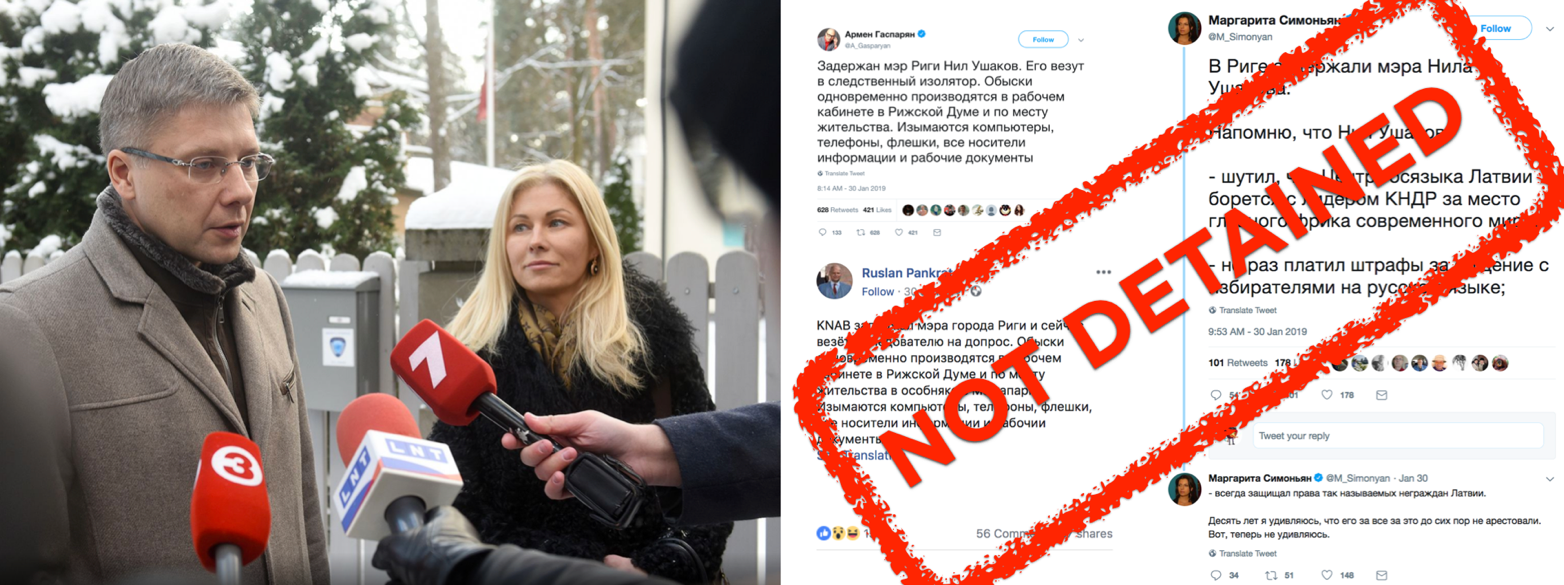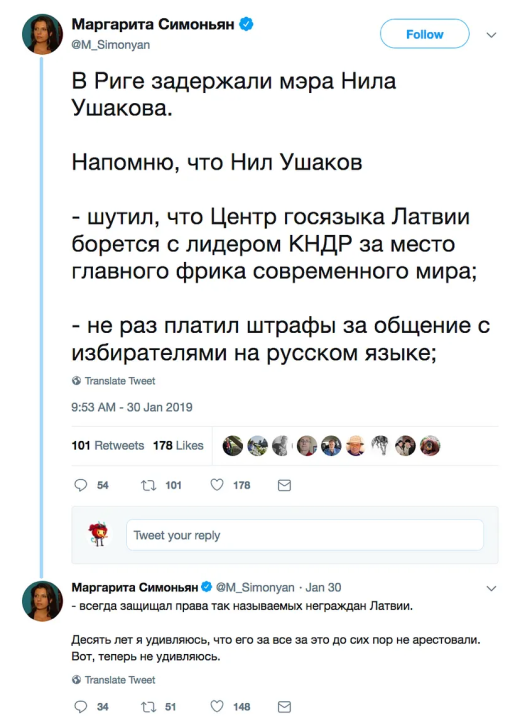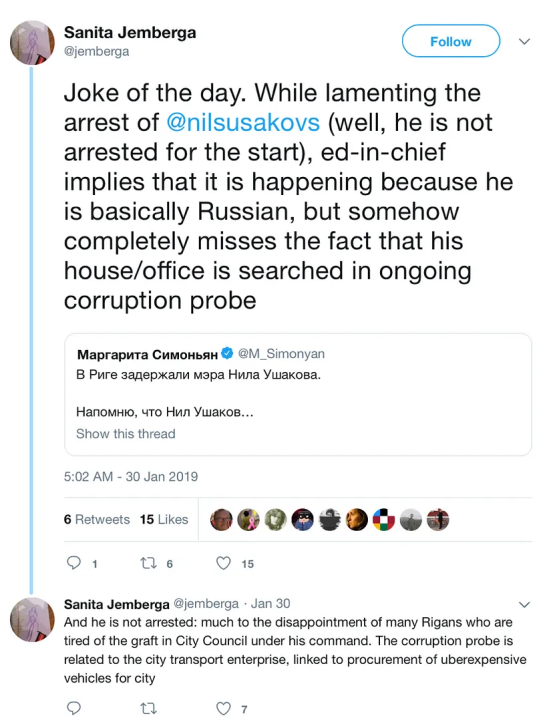#BalticBrief: The “KNABbing” of Riga’s Mayor
An unverified news story claiming Riga’s mayor had been arrested proliferated throughout the Russian media environment
#BalticBrief: The “KNABbing” of Riga’s Mayor

BANNER: (Source: @nikaaleksejeva/DFRLab)
Russian media inadvertently spread a false news story that officers of the Corruption Prevention Bureau (KNAB) had detained the Mayor of Riga, Nils Usakovs, after searching his home and office.
On January 30, KNAB searched Riga City Mayor Nils Usakovs’ office and home. According to Latvian public broadcast online media outlet LSM, “likely, but not certainly, the searches were related to the ongoing investigation over corruption in the Rīgas satiksme municipal transport company.” No charges were brought against Usakovs, however, and he was not detained.
A false story claiming he had been arrested, though, started to spread through Russian-language media, based on an unverified and incorrect Facebook post from Ruslan Pankratov. After Usakovs contradicted the reports of his detention in an interview with the Latvian press, most Russian media outlets clarified that the story was based almost entirely on Pankratov’s post.
While a number of retractions or clarifying social media posts were made, the audience impact of the original false story was far greater. The case also demonstrated the deference the Russian media affords to sources loyal to the Kremlin.
Spreading Misinformation
Pankratov, a former Member of Parliament for the Municipality of Riga and former member of Usakovs’ Harmony party, currently operates as a pro-Kremlin activist in Latvia. As such, some in Russian language media follow his social media accounts, creating a symbiotic relationship wherein they amplify each other’s narratives.

The DFRLab ran a Google search for media articles in Russian that included information about Usakovs’ detention. Out of 135 search results, 65 articles cited Pankratov’s post as evidence that Usakovs had been detained. Six of these articles were published by Russian-language media outlets in Ukraine, two in Azerbaijan, one in Kazakhstan, and one in Belarus. Meanwhile, the Lab identified 20 articles that both cited and debunked Pankratov’s post. There were 32 articles that reported accurately on the searches of Usakovs’ office and home or that referred to Pankratov’s post as unverified. The remaining search results did not match the research topic.
Of the outfits that spread the story, 14 were well-known media outlets in Russia. These were Gazeta.ru; Rambler, the Russian-language version of the Kremlin-owned RT; the Russian Army’s media outlet TV Zvezda; Life.ru; Vzglyad; Politika Segodnya; Russkaya Vesna; NTV; Izvestiya; Fontanka.ru; MK.RU; TV5; and Forbes. Noting a standard of journalistic integrity, almost all of them posted corrections regarding the arrest claim.
The false story spread on Twitter as well. Six out of the top 10 retweeted tweets about Usakovs stated that he was detained. Only two out of the top 10 retweeted tweets refuted the claim.

The most retweeted tweet belonged to Armen Gasparyan, a pro-Kremlin political expert and host of an online political show for Sputnik. He briefly paraphrased Pankratov’s post.

The next tweet Gasparyan posted corrected the falsehood about Usakovs’ supposed arrest. While Gasparyan kept both tweets live, the second tweet garnered significantly fewer retweets and comments than the initial tweet, as is typical when someone issues a clarifying tweet for an initial false story.

Gasparyan later admitted, however, that the claim that Usakovs had been detained was false during a weekly overview of political affairs in Post-Soviet countries published the following day on YouTube. Pankratov published an excerpt from the hour-long video on his YouTube channel. In the video, Gasparyan said:
Ruslan misled everyone. Fu-fu, Ruslan. All agencies based their reports other than on me or Ruslan. Then the poor colleagues were forced to re-shoot interviews, because, what was true at 3:00 p.m. could not be used after 5:00 p.m.
Open-source evidence suggests that Pankratov is a regular source of information for Sputnik and Gasparyan. The DFRLab identified five videos in which Gasparyan interviewed Pankratov about the situation in Latvia.

Pankratov periodically republishes interviews with Gasparyan on his YouTube channel and writes for Sputnik Latvia.
Accusations of Russophobia
Many media outlets, such as RIA Novosti, Vzglyad, Russkaya Vesna, and NTV, mentioned that Usakovs champions the rights of ethnic Russians in Latvia. Russophobia is a regular accusation levied by the Kremlin against Latvia as a country, Latvian politicians, and ethnic Latvians. Russia and Latvia regularly clash over the status of ethnic Russians and the Russian language in Latvia, an issue which has strained relations ever since Latvia regained independence from the Soviet Union in 1991.
In another popular tweet, Russian political commentator Ruslan Ostashko asked if people believe the “official” reason given for Usakovs’ detention: his alleged involvement in a corruption scandal. The tweet implied that the corruption scandal served as a pretext for arresting Usakovs.
The top three most liked replies to Ostashko’s tweet suggested that Usakovs was detained because he is Russian.

Ostashko did not post a correction on Twitter.
The verified Twitter account of the Editor-in-Chief of Kremlin-owned media outlet RT, Margarita Simonyan, also tweeted that Usakovs had been detained. The tweet implied that Usakovs was detained because he was an ethnic Russian and had defended Latvia’s Russian non-citizens.

In one of the replies to her tweet, the Ambassador of Latvia to Russia, Maris Riekstins, tweeted:
“When disseminating information, I ask to stick to the facts. The Riga Mayor was not detained. And it is of course unnecessary to attribute politics and ethnicity to procedural actions.”
On her account, Latvian investigative journalist Sanita Jemberga quoted Simonyan’s tweet and denounced Simonyan’s claim that KNAB authorities searched Usakovs’ home and office because he is Russian.
Simonyan also published a tweet clarifying that Usakovs had contradicted the reports that he has been detained. Both tweets are still live, although the original tweet had more impact.
Conclusion
The DFRLab identified many Russian media sources that spread misinformation that Riga Mayor Nils Usakovs had been detained. While the KNAB did conduct searches of his home and office, they did not detain him.
In most cases, media outlets cited the Facebook post by a pro-Kremlin activist in Latvia, and former colleague of Usakovs, Ruslan Pankratov. Pro-Kremlin commentator Armen Gasparyan subsequently amplified Pankratov’s misinformation via Twitter. Gasparyan has previously interviewed Pankratov on the situation in Latvia.
Many media outlets and popular Twitter accounts that initially spread the false news reports that Usakovs had been detained, including RT, published corrections several hours later. These corrections suggest that, in this instance, Russian-language media outlets and commentators spread misinformation inadvertently. Overall, the Usakovs detainment case demonstrates the outsized trust Russian outlets and commentators afford to pro-Kremlin activists operating in Latvia as well as the wider Baltic states and further emphasizes the lack of an independent fact-checking mechanism within the Russian media environment.
Follow along for more in-depth analysis from our #DigitalSherlocks.


